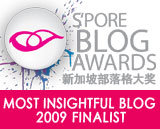[How to REACH out using new media]
There were several insights shared yesterday during a PAYM Policy Forum on New Media. I was facilitating one of the eight groups which had various topics. I was assigned the group New Media and Politics.
It was an engaging discussion. But first, let me state my overall comment on the recommendations that have been adopted. I feel that it is a cautious approach that the Government is taking. Why is that so? I think if the changes had been too drastic, it would become too difficult to pull back what they have earlier accepted. Then it would really seem that the Government had taken two steps forward and one step back. Another participant had likened it to taking one step when we could have taken three.
Yesterday, Seelan Palay (he was involved in making the film One Nation Under Lee which I had blogged about in the past) was one of the participants at the table which I was facilitating. Another filmmaker Ho Choon Hiong was there too. Choon Hiong raised valid points with regard to political films. He also talked about the open discussion of films in public instead of an outright ban. He was referring to the Government's ban on the film Said Zahari's 17 Years during the question and answer session.
Seelan Palay had asked if Lee Kuan Yew's teary announcement was emotional in response to Ms Irene Ng's classification of political films. She had mentioned that political films are factual accounts with no dramatisation. Seelan Palay also asked about the liberalisation of the Newspaper and Printing Presses Act.
I asked how REACH has contributed to policymaking in Singapore and the effectiveness of REACH so far. I further asked if there are considerations for engaging beyond REACH in the future. Ms Ng's reply that the Government will be looking for ways to engage creatively beyond REACH in the future.
Apart from those thoughts, Mr Cheong Yip Seng, Chairman of the Advisory Council on the Impact of New Media on Society had shared further about harnessing new media as a tool for the elections. He cited the then new media which was TV. Mr Cheong had an anecdote about how the use of "live" TV had swayed opinions in the US elections in 1960. Kennedy appeared confident and tanned on TV in contrast to Nixon. He added that Nixon was not attuned to new media and that had contributed to his loss.
Another example was in Philippines where anti-Estrada forces were mobilised using new media which led to the toppling of the Government in 2001.
What Mr Cheong was saying was that the Internet is a "neutral" platform which favours no one and is non-partisan. But the key is how well one uses new media.
Ms Irene Ng also challenged us to test out the REACH system which I did today. Immediately, I had more thoughts and I drafted a letter to the mainstream media.
I think one big problem about not engaging beyond REACH will create the impression of an unresponsive Government.




0 Comments:
Post a Comment
<< Home